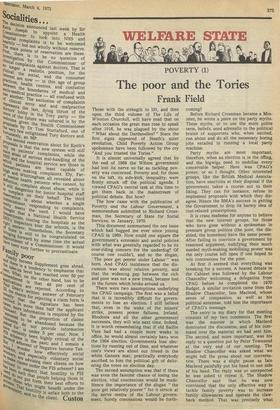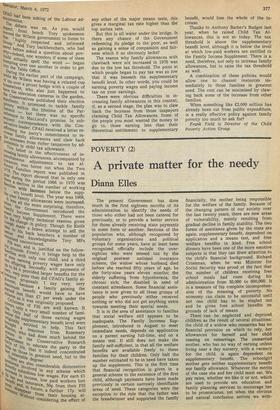The poor and the Tories
Frank Field
Those with the strength to lift, and then open the third volume of The Life of Winston Churchill, will have read that on each occasion the great man rose to speak after 1916, he was plagued by the shout "What about the Dardanelles?" Since the first signs appeared of Heath's quiet revolution, Child Poverty Action Group spokesmen have been followed by the cry "And you trusted the Tories."
It is almost universally agreed that by the end of 1968 the Wilson government had lost its nerve so far as tackling poverty was concerned. Poverty and, for those on the left, its side-kick, inequality, were firmly struck off the political agenda. I viewed CPAG's central task at this time to get them back in the mainstream of political debate. But how?
The how came with the publication of Poverty and the Labour Government, a memorandum submitted to Richard Crossman, the Secretary of State for Social Services, in January, 1970.
This document summarised the one issue which had bugged me ever since joining CPAG in 1969. How could one square the government's economic and social policies with what was generally regarded to be its over-riding concern for the underdog? Of course one couldn't, and so the slogan, 'The poor get poorer under Labour" was born. And CPAG insistence that the discussion was about relative poverty, and that the widening gap between the rich and poor was not a new trend, became lost in the furore which broke around us.
There were two assumptions underlying the CPAG campaign. The first was a belief that it is incredibly difficult for governments to lose an election. I still believe that, even in the wake of the miners' strike, present power failures, Ireland, Rhodesia and all the other government successes, they will win next time. Indeed, it is worth remembering that if old Baillie Vass had had a couple more weeks in office, he would almost certainly have won the 1964 election. Governments lose elections by running out of time, and whatever one's views are about our friend in the white Gannex mac, practically everybody ascribed to him the political gift of delivering the votes on election day.
The second assumption was that if there was even the faintest chance of losing the election, vital concessions would be made. Hence the importance of the slogan "the poor get relatively poorer" for it struck at the nerve centre of the Labour government. Surely concessions would be forth coming?
Before Richard Grossman became a Minister, he wrote a piece on the party myths. These myths, or to use the more polite term, beliefs, send adrenalin to the political brains of supporters who, when excited, run about and do all the necessary boring jobs entailed in running a local party machine.
Party myths are most important, therefore, when an election is in the offing, and the bigwigs need to mobilise every conceivable helper. Here was CPAG's power, or so I thought. Other interested groups, like the British Medical Association, have sanctions at their disposal if the government takes a course not to their liking. They can for instance, refuse to implement proposals with which they disagree. Hence the BMA's success in getting the Government to drop its barmy idea of cost-related prescriptions.
It is crass madness for anyone to believe that the new interest groups, for those who have gone without a spokesman in pressure group politics (the poor, the disabled, the homeless) have the same power. After failing to convince a government by reasoned argument, nullifying their much needed myth-making mobilising power was the only course left open if one hoped to win concessions for the poor.
At first it seemed that everything was breaking for a success. A heated debate in the Cabinet was followed by the Labour Chancellor welcoming a delegation from CPAG before he completed the 1970 Budget. A similar invitation came from the Shadow Chancellor, lain Macleod, whose sense of compassion, as well as his political antennae, told him the importance of CPAG's message.
The entry in my diary for that meeting consists of my two comments. The first was the manner in which Macleod dominated the discussion, and of his command over the material we had sent him. The second, and more important, was his reply to a question put by Peter Townsend at the very end of our meeting. The Shadow Chancellor was asked what we might tell the press about our conversation. There was a slight pause as lain Macleod painfully put his hand to one side of his head. The reply was so unexpected he was asked to repeat it. The Shadow Chancellor said that he was now convinced that the only effective way to tackle family poverty was to increase family allowances and operate the clawback method. That was precisely what CPAG had been asking of the Labour adininistration. The debate was on. As you would expect, front bench Tory spokesmen that the Wilson government to listen to ',Ilat " highly respected and informed _ '1.°11P," And Tory backbenchers, who had never before asked a question about povertY--indeed, one wonders if some of them e0111d actually spell the word t,rarnpling over one another in order to getl0 the Table Office. uuring the earlier part of the campaign, while AN n, , t' Wilson was having a relaxed cup lc' Lea over a privet hedge with a couple of ,auseWives, who also just happened to tlave the television cameras in the garden, "e Conservatives published their election Inanifesto. It promised to tackle family Pov erY within the lifetime of the Par"grrient —, but there was no specific sreference to MacLeod's promise. In sub!tit-lent vative correspondence with the Conleader, CPAG received a letter reao.ffirrning the party's commitment to in the family allowances and claw back i_, increases from richer taxpayers by ad .'s,rull.ents to child tax allowance. ere 05. belief in the effectiveness of insi asirig family allowances, accompanied by lothultaneous adjustments to tax al p_wattees, was borne out when the Two 1,,''.7rent o Families report was published in Year' The report showed that in only one there eluting the period 1966 to 1970 was fat,;l'., a decline in the number of working Cies With incomes below the suPP the --20rY benefit level. The year was 1968, ItY:ae farnilY allowances were increased \vile -as all the more surprising, therefore, pama. the Government introduced the sorn-'11Y Income Supplement. There were for he technical ve c rY highly given hnical reasons he technical ve c rY highly given hnical reasons Jose 1.. Change in policy. Though Sir Keith ideaP't rnade a brave attempt to sell the 0s his back benchers a number of senior rere,, and knowledgeable Tory MPs ,Is'iled unconvinced. inR was, and is, justified on the followfarnriunds. Firstly, it brings help to the pi iLleS With only one child, and a third ooele.,° earning poverty wages have only o op 4...u'Ispring. Secondly, with payments f it provided larger benefits for the = lo,„van tY poor than did CPAG's family alPoore ea Proposals. I say very, kiexi st, because a family gaining vethrye earrtrtia0"I benefit would have to have schertled less than £7 per week under the ori,a as it was originally proposed. ies. eoverlicisins of PIS are well known. It l sne,rtlY a very small number of fami bei, Y half of those earning s'W th l were ariginail e suPPlementary benefit level bk.routht'Y entitled to help. This fact marter, a response from Rosemary Pkeoe's''' Who had done much behind the ePart, ill the Conservative Research 'acts 'ant to educate the party to the ihelp, Z ilife, that it indeed concentrated in greatest need, but to the .rh'nerl erable degree! Proble e are also considerable disincentive lir rris invol • i ettlx, . ved in any scheme which . Atrea." p tax income, low paid workers lost ' Ilenek arid insurance, 50p from their FIS IsaP , in future, a further l 713 will 10W "pe atice ar from their housing al: . "ttitont considering the effect of any other of the major means tests, this gives a marginal tax rate higher than the top surtax rate. But this is all water under the bridge. Is there any chance of the Government redeeming its pledge to the poor, as well as gaining a sense of compassion and fairness which it so obviously lacks?
The reason why family allowances with clawback were not increased in 1970 was due to the low tax threshold. The point at which people began to pay tax was so low that it was beneath the supplementary benefit level. In other words, you could be earning poverty wages and paying income tax on your earnings. There were obvious difficulties in increasing family allowances in this context, if, as a second stage, the plan was to claw back the increase from those taxpayers claiming Child Tax Allowances. Some of the people you most wanted the money to go to, those earning less than their theoretical entitlement to supplementary benefit, would lose the whole of the increase.
Thanks to Anthony Barber's Budget last year, when he raised Child Tax Allowances, this is not so today. The tax threshold is above the supplementary benefit level, although it is below the level at which low-paid workers are entitled tO the Family Income Supplement. There is a need, therefore, not only to increase family allowances, but to raise the tax threshold as well.
A combination of these policies would allow one to channel resources immediately to those families in greatest need. The cost can be minimised by clawing back some of the increase from other families.
When something like £2,000 million has already been cut from public expenditure, is a really effective policy against family poverty too much to ask for?
Frank Field is Director of the Child Poverty Action Group.











































 Previous page
Previous page